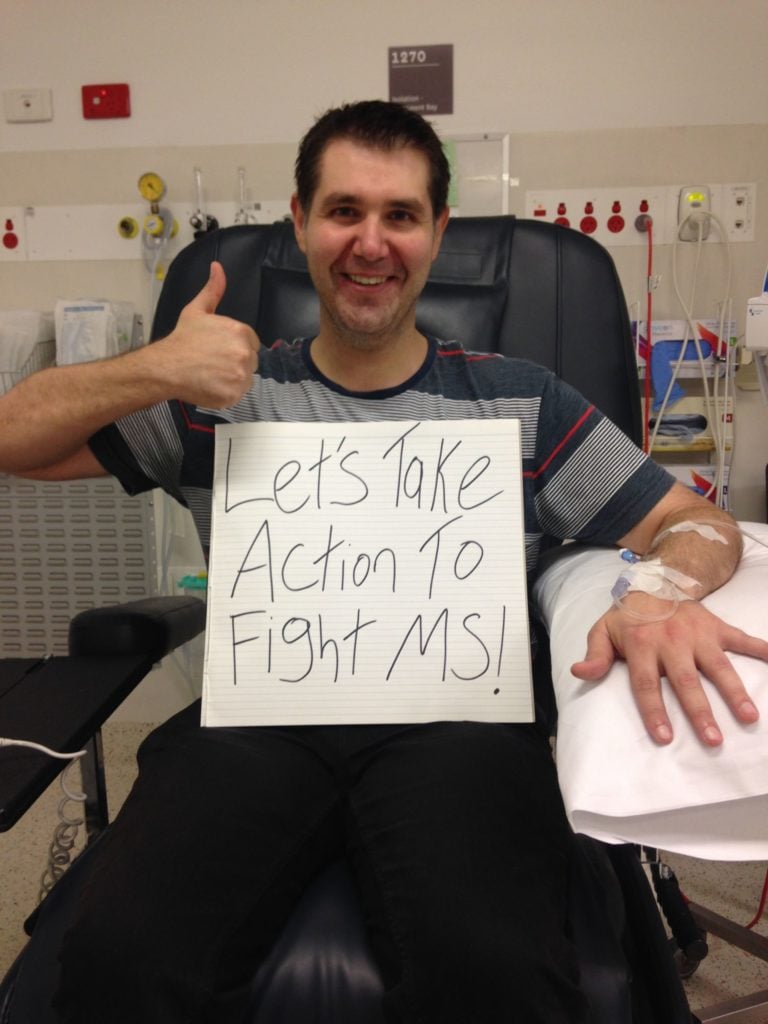When Stephen Papadopoulos was 16, he noticed his body behaving strangely but he did not know what the symptoms meant. He had blurry vision and other signs indicating the possibility of multiple sclerosis, but the diagnosis was not forthcoming until he was 22 years old. As a result, his teenage self thought he was going crazy. Now, at the start of his Forties, Mr Papadopoulos takes the opportunity to raise awareness on occasions such as World MS Day (30 May).
As an MS Ambassador, he wants people to know that, even though he can run, jump and dance, not a moment goes by where he doesn’t feel pain. “MS can be quite invisible,” he told Neos Kosmos, adding that Visibility is this year’s theme of Multiple Sclerosis Day (#MyInvisibleMS). “Somebody may be smiling but all sorts of things may be happening on the inside.”
Mr Papadopoulos does not know what it is like to live without pain. “Sharp stabbing pains and pins and needles are symptoms I feel all the time, and I have a burning sensation and so much pain that it is difficult to sleep at night,” he said. Other invisible symptoms can include brain fog (cognitive difficulties), depression, continence problems and balance issues/dizziness.
The fact that symptoms vastly differ, means there are a number of misconceptions about MS. It is a fallacy that all people living with MS, limp or end up in wheelchairs.
Luckily, in Mr Papadopoulos’ case, the signs of MS are not evident. However, the relapses are unpredictable.
“When going through my apprenticeship as a chef, my hands would shake and I couldn’t feel heat. One day my left elbow was burning, and I couldn’t feel that at all in order to move away from the heat,” he said, another time he was paralysed for a few weeks.
Nor is MS hereditary. Mr Papadopoulos comes from a large family, originally from Kalabaka, Thessaly. “Dad is one of nine siblings, however I am the only one in my large family with MS,” Mr Papadopoulos said, adding that just because multiple sclerosis comes from a Greek word doesn’t mean that Greeks have greater insight into it. “It’s a condition of the central nervous system, interfering with nerve impulses within the brain, spinal chord and optic nerves, known as sclerosis – a Greek word meaning scars,” he said.
His condition is not unique. He is just one of 25,600 people in Australia that are affected by the condition, and over two million worldwide. And despite having heard of what MS was during a school MS Readathon at the age of 12, Mr Papadopoulos said that nothing could have prepared him for what he was to encounter years later.
READ MORE: Vasso Apostolopoulos believes ‘there are cures for every disease, sitting in fridges‘
As an MS ambassador he spends a great deal of his time making people more aware. His role also helps him come to terms with MS, which doesn’t need to be a lonely experience.
Mr Papadopoulos survives by masking his pain. “I have to be more funny, charming, entertaining,” he said. “I try and keep positive by focusing on other things. Then I go home and switch off the charm.”
It is natural for most people to forget that he has MS. “Even my parents forget that I am have MS,” he said, adding the importance of getting emotional support. On his part, his role as an MS ambassador helps him to reflect on his condition and better accept himself in a world that defaults to the able-bodied and where it is assumed that everyone can walk for a kilometre without being tired.
His message to people with MS, such as himself is this: “Stay positive, and look at the good things in life!”

ADDITIONAL INFO
World MS Day 2019 is on Thursday, 30 May. To get involved in World MS Day, visit https://worldmsday.org/tools/
Understanding Multiple Sclerosis MOOC is a free online course available at the Menzies Institute for Medical Research. Find out more at https://www.menzies.utas.edu.au/education/free-online-courses









